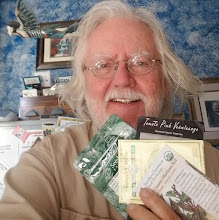For all of the history of agricultural civilization, the farmers and gardeners saved their seeds to have something to plant next year. As soon as humankind began to depend on crops grown in tended fields, saving seeds was as much a part of the process as was planting seeds the following growing season.
This is the way it was, each generation of humans selecting the seeds that would be the food of the following year. In this manner, humans were 'breeding' their crops for characteristics they found desirable. Larger grains, resistance to falling apart in the field before they could be harvested and so on. It was not called 'breeding' but it was breeding. Every choice to save one seed over the others in the basket or on the plant was a decision that carried some genetic information forward and left others to be eaten.
We know this is true because ethnobotanists can look into the detritus of past civilizations and tell within a few years of when a crop becomes domesticated. The change from a wild seed crop to a domesticated seed crop is dramatic and fairly rapid. Seed heads become more uniform, the seeds are larger, they don't fall apart easily in the field and other characteristics clearly delineate the departure from 'natural selection' to human selection.
It continues this way over all history. Up until about the 1950's. In the late 1800's seed companies sprang up to help people experience other seeds, lending a diversification that gardens hadn't been able to have unless the owner traveled a bit or had connections in other parts of the land. The average gardener didn't have access to anything that wasn't local. But seed companies made a lot of seed available to these gardeners and expanded the ability of regions to grow seed adapted to their areas from other similar climates that may not be nearby.
Still, barring a disaster, once a gardener purchased the seed, the gardener would save seeds for future plantings until some other seed tantalizingly calls to be planted (we all know what that feels like). Seed companies also tried to breed new plants to be able to offer something new each year. This was the heyday of many great American seed companies that became institutions, like Burpee, introductions we are all familiar with were bred at Burpee's Fordhook Farm - including Fordhook Swiss Chard. Other plants were bred by a horde amateur seed breeders - including the mechanic 'Radiator Charlie' who paid off his house with sales of seeds of his "Mortgage Lifter" tomato.
I remember many winters as a child in Kansas, sitting in front of Grandpa's woodstove with snow all over the garden. I went through the Burpee catalog, Park Seeds and many other seed proprietor catalogs underlining dozens of plants I wanted Grandpa to order for the coming year - I read each catalog hundreds of times, memorizing the descriptions and the names and adoring every single variety - the Burpee catalog in those days was many, many more pages long than it is today. Grandpa never did, by the way. He saved his own seeds for the most part and, if he needed more seed, he bought locally. I didn't understand this until I was an adult growing my own seeds and feeling a little sheepish at how demanding I was about ordering seeds that Grandpa didn't want or need.
Up until the 1950's, one thing that was true of ALL plant breeding was done by amateur plant breeders. Sometime around the 1950's breeding began to fall into the hands of college educated plant breeders - people well versed with genetic backgrounds - and the beginning of commercial funding of science research. The focus shifted from regional seed production to national and international seed sales and companies more interested in profit than in 'traditional values' of the older seed breeders. Run on that Republican traditional value politicians!
This became the years of the hybrids and crop yields went through the roof! But the concentration was entirely on bushels per acre and very little else. In many cases the plants required disease resistance in order to produce well and that was bred into the plants. I don't want to disparage many advances made in this time frame because a lot of valuable work was done that should not be thrown out simply because the primary interest was in selling hybrid seeds.
Mind you, to me, the line was crossed with genetically modifying plant seeds. And patenting seeds. This is one more of the incursions the 'industrial' model of agriculture. Once the industrial model was applied to agriculture, and profit became the only motive, agriculture as a whole was set adrift, and no part was more adrift than plant breeding. The point was to make profit and keep making profit for as long as possible. Hence, patents were 'necessary' and positive traits, valuable to individual gardeners and farmers and the eventual consumers (like taste) became lost in the race for profit. By the time I became an adult gardener in the 1980's, seeds no longer were the seeds of my grandfather.
More on this tomorrow: the next frontier for garden seeds.
david
for the Seed library of Los Angeles, SLOLA













.jpg)